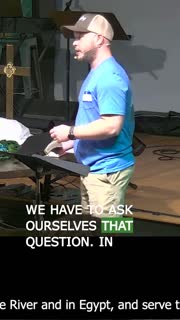Trusting God's Promises Through Unique Callings and Community
Devotional
Sermon Summary
Bible Study Guide
Sermon Clips
1. "God does not forget us. God does not forsake us. God does not leave us in the place in which we are right now. So all of this has taken place. There's a few things that we can pull from what's happening here. A few things from the narrative. Joshua's part of this God story. What is this movement of transition? Transition, not only physical transition of actually trekking across the land, right? But leader transition. From people to people. It's also about living in the promises of God. How are the people, how is this new leader, Joshua, that God has raised up going to live in the promises that God has set forth for God's people?" [32:55] (60 seconds)
2. "God isn't asking you to feel someone else's shoes. God isn't asking you to even feel God's shoes. We've seen that. I just talked about Abraham and Sarah. Don't feel my shoes. You're not God. I don't need you to fulfill this thing. I'm helping you. I want you to fulfill this thing. Let me, as God, be God. God is asking us to live our truth. To live how God has made us. To live as the creative, unique, called individuals that we are. Not to live like someone else." [37:33] (42 seconds)
3. "God didn't call Joshua to lead the Israelite people and the new generation to the promised land in the same way that he called Moses. He didn't call Joshua or lift up Joshua to be the leader of the people. To be a replacement for Moses. Didn't call up Joshua to fit Moses' shoes. He called, God called Joshua to be Joshua. Not someone that's impersonating God. Not someone that's impersonating someone else. To lead the people and to share how God would provide for them the entire way." [38:32] (42 seconds)
4. "God has not left us. God has not forsaken us. God is present with us. We're going to go to the end of Joshua. Joshua 24. 19 through 26. You've probably heard this in some way or another in life. And may not even know it came from here. But this is a renewing of God. The people. And with God a covenant. A reminder. Of who are you choosing this day. But Joshua said to the people. You cannot serve the Lord. For he is a holy God. He is a jealous God. He will not forgive your transgressions or your sins. If you forsake the Lord. And serve foreign gods. Then he will turn and do you harm. And consume you after having done you good." [43:47] (67 seconds)
5. "We have to ask ourselves that question. In continual covenant. The covenant that has been made. Through the blood of Jesus Christ. We have to continually ask ourselves. Day in and day out. Who do I choose to serve this day? And I pray. That our answers are. The Lord God almighty. The one who does not forsake. The one who does provide. The one who will be with us. In and through the days of our lives." [47:47] (32 seconds)
6. "God will speak to you. And however God feels led to speak to you. And so if we are seeking. And thank you Aaliyah. If we are seeking ways in which we think. God is going to speak to us. We might be missing out on where. God is really speaking to us. So you can share whatever you want to. And if you feel led to do so. You can just chat with me. And we'll plan a time. We'll talk about it if you want to. And we'll go from there." [01:02:49] (25 seconds)
7. "As we leave tonight, a few things I think we can be reminded of is that God loves you. That's a gospel message. It's right there. And I think we have to come to a place to accept that love. And in the midst of that love, and accepting that love and grace from God is also a part in that is sharing that with our friends, our brothers and sisters in this world. And we do that through simple ways, however God calls you to do it. And so, let's do it." [01:12:40] (44 seconds)
8. "God has spoken through people. In some way. God has spoken through scripture. God has spoken through multiple different ways. To me. That has led me to where I am. Because we are all unique. Because we are all created. In the image of God." [01:02:21] (19 seconds)
Ask a question about this sermon
2. "God isn't asking you to feel someone else's shoes. God isn't asking you to even feel God's shoes. We've seen that. I just talked about Abraham and Sarah. Don't feel my shoes. You're not God. I don't need you to fulfill this thing. I'm helping you. I want you to fulfill this thing. Let me, as God, be God. God is asking us to live our truth. To live how God has made us. To live as the creative, unique, called individuals that we are. Not to live like someone else." [37:33] (42 seconds)
3. "God didn't call Joshua to lead the Israelite people and the new generation to the promised land in the same way that he called Moses. He didn't call Joshua or lift up Joshua to be the leader of the people. To be a replacement for Moses. Didn't call up Joshua to fit Moses' shoes. He called, God called Joshua to be Joshua. Not someone that's impersonating God. Not someone that's impersonating someone else. To lead the people and to share how God would provide for them the entire way." [38:32] (42 seconds)
4. "God has not left us. God has not forsaken us. God is present with us. We're going to go to the end of Joshua. Joshua 24. 19 through 26. You've probably heard this in some way or another in life. And may not even know it came from here. But this is a renewing of God. The people. And with God a covenant. A reminder. Of who are you choosing this day. But Joshua said to the people. You cannot serve the Lord. For he is a holy God. He is a jealous God. He will not forgive your transgressions or your sins. If you forsake the Lord. And serve foreign gods. Then he will turn and do you harm. And consume you after having done you good." [43:47] (67 seconds)
5. "We have to ask ourselves that question. In continual covenant. The covenant that has been made. Through the blood of Jesus Christ. We have to continually ask ourselves. Day in and day out. Who do I choose to serve this day? And I pray. That our answers are. The Lord God almighty. The one who does not forsake. The one who does provide. The one who will be with us. In and through the days of our lives." [47:47] (32 seconds)
6. "God will speak to you. And however God feels led to speak to you. And so if we are seeking. And thank you Aaliyah. If we are seeking ways in which we think. God is going to speak to us. We might be missing out on where. God is really speaking to us. So you can share whatever you want to. And if you feel led to do so. You can just chat with me. And we'll plan a time. We'll talk about it if you want to. And we'll go from there." [01:02:49] (25 seconds)
7. "As we leave tonight, a few things I think we can be reminded of is that God loves you. That's a gospel message. It's right there. And I think we have to come to a place to accept that love. And in the midst of that love, and accepting that love and grace from God is also a part in that is sharing that with our friends, our brothers and sisters in this world. And we do that through simple ways, however God calls you to do it. And so, let's do it." [01:12:40] (44 seconds)
8. "God has spoken through people. In some way. God has spoken through scripture. God has spoken through multiple different ways. To me. That has led me to where I am. Because we are all unique. Because we are all created. In the image of God." [01:02:21] (19 seconds)








